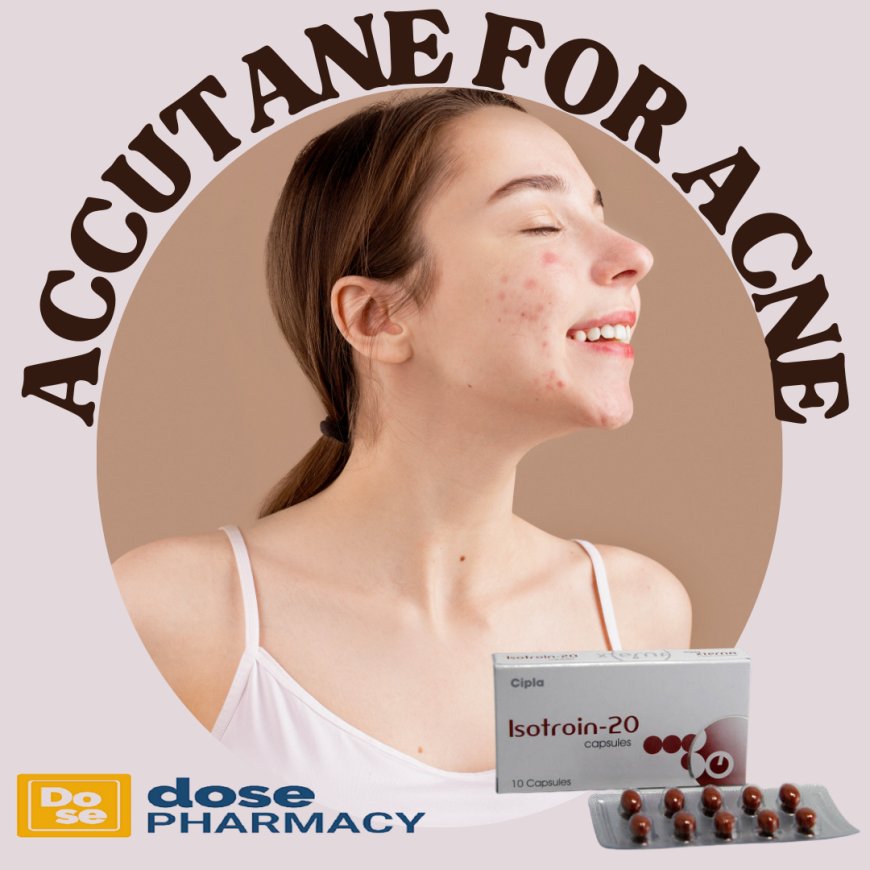How Well Does Accutane Work For Acne?

Buy Accutane Online, also known by its generic name isotretinoin, is a powerful medication primarily used to treat severe acne. It's often considered a last resort for patients who haven't responded well to other acne treatments. In this discussion, we'll delve into how well Accutane works for acne, exploring its mechanisms, effectiveness, potential side effects, and considerations for use.
Understanding Acne and Its Impact
Acne is a common skin condition that affects millions of people worldwide, especially during adolescence and young adulthood. It occurs when hair follicles become clogged with oil and dead skin cells, leading to the formation of pimples, blackheads, and cysts. While mild acne can often be managed with topical treatments like benzoyl peroxide or salicylic acid, moderate to severe cases may require more aggressive intervention.
Mechanism of Action
Buy Isotretinoin Online belongs to a class of medications called retinoids, which are derivatives of vitamin A. Its precise mechanism of action in treating acne is multifaceted:
-
Reduction of Sebum Production: Accutane significantly decreases the production of sebum, the oily substance that contributes to clogged pores and acne formation. By reducing sebum production, it helps prevent new acne lesions from developing.
-
Normalization of Skin Cell Shedding: The drug promotes the shedding of dead skin cells from hair follicles, preventing them from accumulating and clogging pores.
-
Anti-inflammatory Effects: Accutane has anti-inflammatory properties, which can reduce the redness, swelling, and pain associated with acne lesions.
-
Inhibition of Bacterial Growth: It also inhibits the growth of Propionibacterium acnes, a type of bacteria that contributes to acne development.
Effectiveness of Accutane
Accutane is highly effective for treating severe acne, particularly the nodular or cystic forms that are deep, painful, and prone to scarring. Clinical studies have shown that a significant percentage of patients experience a dramatic improvement in their acne symptoms after completing a course of Accutane treatment.
-
Reduction in Lesion Count: One of the primary measures of Accutane's effectiveness is its ability to reduce the number of acne lesions. Many patients see a substantial decrease in both inflammatory and non-inflammatory lesions over the course of treatment.
-
Prevention of Scarring: By targeting severe forms of acne early, Accutane can help prevent the development of permanent scars, which can have a profound impact on a person's self-esteem and quality of life.
-
Long-term Remission: For some patients, Accutane can lead to long-term remission or even a permanent cure for acne. This is especially true for those with severe acne who have exhausted other treatment options without success.
Treatment Protocol
Accutane is typically taken orally in the form of capsules or tablets. The standard treatment protocol involves a daily dose for a period of several months, with the exact duration and dosage tailored to each patient's needs. A typical course of Accutane lasts between 4 to 6 months, although some individuals may require longer treatment.
-
Initial Response: Many patients start noticing improvements in their acne within the first few weeks of starting Accutane. However, it's important to continue the full course of treatment as prescribed by a healthcare professional to achieve optimal results.
-
Monitoring and Follow-up: Regular monitoring is essential during Accutane treatment to assess its effectiveness and monitor for any potential side effects. Patients are usually required to undergo blood tests and dermatologist visits at regular intervals.
-
Relapse Prevention: In some cases, acne may partially or fully relapse after completing Accutane treatment. To prevent this, dermatologists may recommend maintenance therapy with topical treatments or a second course of Accutane if necessary.
Side Effects and Risks
While Accutane can be highly effective, it also carries significant risks and potential side effects that require careful consideration.
-
Dryness and Sensitivity: One of the most common side effects of Accutane is dryness of the skin, lips, and eyes. Patients may also experience increased sensitivity to sunlight.
-
Muscle and Joint Pain: Some individuals may develop muscle aches, joint pain, or stiffness during Accutane treatment.
-
Mood Changes: There have been reports of mood changes, including depression and suicidal thoughts, in a small percentage of Accutane users. While the causal relationship is not fully understood, patients and healthcare providers should be vigilant for any signs of mood disturbances.
-
Birth Defects: Accutane is highly teratogenic, meaning it can cause severe birth defects if taken during pregnancy. Female patients of childbearing age must use highly effective contraception and adhere to strict pregnancy prevention programs while on Accutane.
-
Liver Function: Accutane can affect liver function, so regular monitoring of liver enzymes is necessary during treatment.
Considerations for Use
Before starting Accutane, patients and healthcare providers must consider several factors:
-
Severity of Acne: Accutane is typically reserved for severe, treatment-resistant acne that has not responded adequately to other therapies.
-
Medical History: Patients with certain medical conditions, such as liver disease or psychiatric disorders, may not be suitable candidates for Accutane. A thorough medical history and evaluation are essential before prescribing the medication.
-
Pregnancy Risk: Due to its teratogenic effects, Accutane should never be taken during pregnancy or if there is a possibility of pregnancy without appropriate contraception.
-
Patient Education: Patients should receive comprehensive education about the potential risks, benefits, and requirements of Accutane treatment, including the need for regular monitoring and adherence to pregnancy prevention measures.
Conclusion
Accutane is a highly effective treatment for severe acne, offering significant improvements in lesion count, prevention of scarring, and long-term remission for many patients. However, its use requires careful consideration of potential side effects, risks, and adherence to strict protocols, especially regarding pregnancy prevention. Patients considering Accutane should consult with a dermatologist or healthcare provider to determine if it's the right option for their acne management needs.







